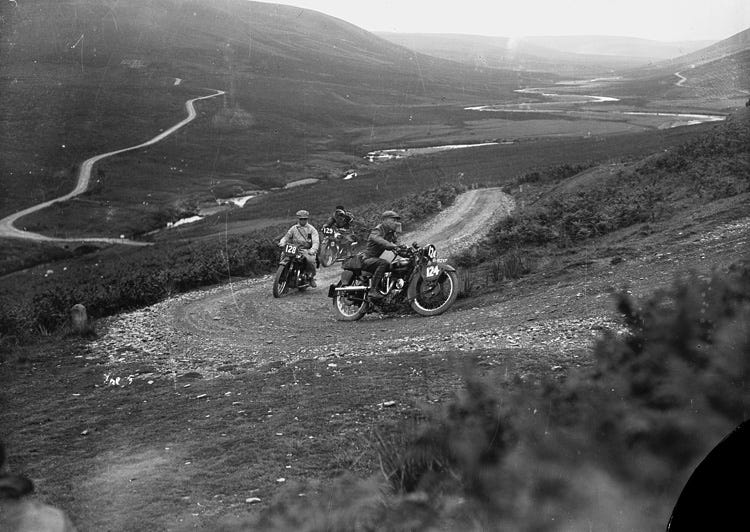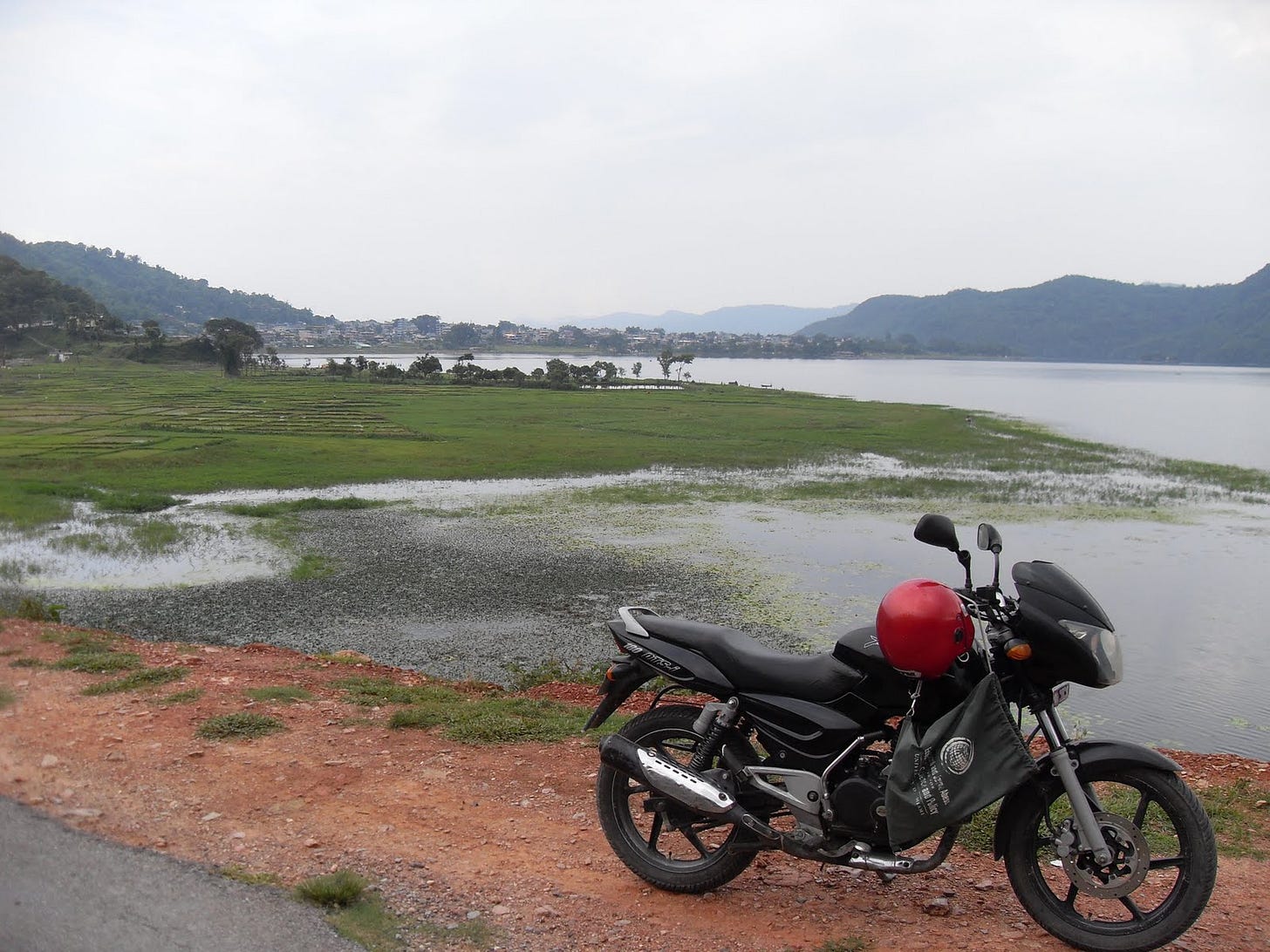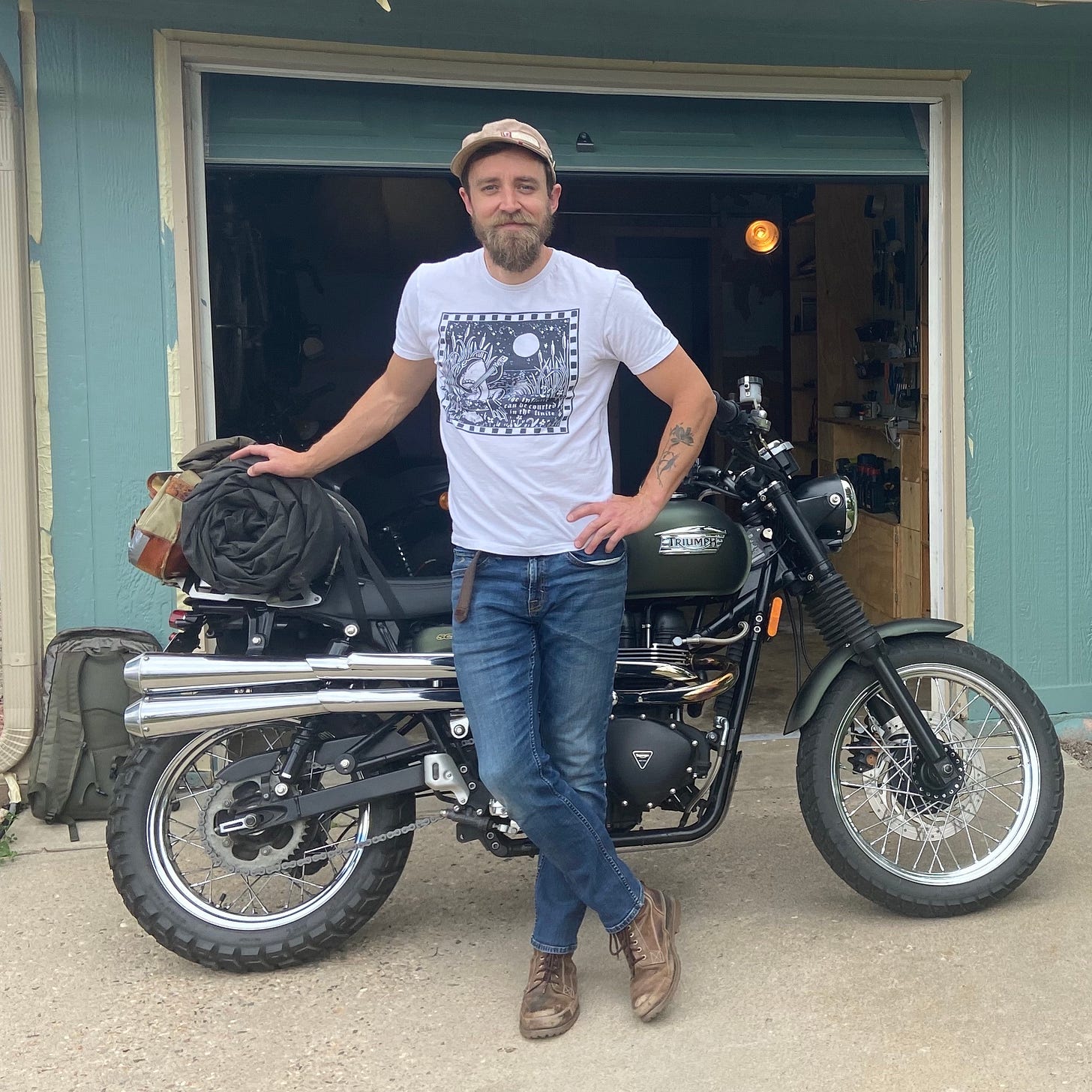The motorcycle as a medium for poetry
On the sympathy between reader and rider, absence and understanding
“I hear the airborne-fire, the dead rebels’
second speech, which follows their live words,
and the rice, and the motorcycles”— Robin Blaser
When you ride a motorcycle out the back of Red Feather Lakes—an archipelagic mountain town in the subalpine Rockies northwest of Fort Collins—you do so on Larimer County Road 67J. Packed dirt wends through an ecoregion known as Crystalline Mid-Elevation Forest, a denomination I find perfectly exhilarating; strange heaping pegmatite boulders like shoulder muscles shrug up everywhere among shrubland and pine.
Before heading for 67J myself, I duck into Red Feather Lakes Community Library to use the restroom, change riding gloves, and hide from the wind. That much accomplished, now killing time, I ask the librarian whether she thinks a storm is coming. She gently reminds me that she’s not a meteorologist, so she really can’t say, but that these on-and-off rains herald the North American Monsoon, continental wind patterns that bring increased moisture to the range.
It was a silly question, really. I’m no stranger to these mountains; I live in their shadow and know their awesome patterns and extremes. But something about a librarian just pulls it right out of me. A good librarian is a master of affirming the inquisitive inner child. Whether robed in motorcycle leather or a garbage bag, wearing spectacles or neck tattoos, the human standing before a librarian is a being with infinite room for growth.
Librarians today are stuck (to put it lightly) between information science and social work, which is to say that their vocation mirrors the greater cultural anguish wrought by technological society: the antipathy of objective and subjective viewpoints, of utility and sentience, it and thou. I don’t mean to suggest that discrete and indiscrete ways of perceiving the world are somehow inherently at odds, but that technology—or the technical impulse, in tandem with global capitalism—has a way of exacerbating the divide.
In a remarkable lecture at the Minneapolis College of Art and Design in 1974,1 following the explosive popularity of his newly published book, Zen and the Art of Motorcycle Maintenance, Robert Pirsig addressed this divide, extemporaneously, while waiting to be introduced:
“I’m waving at my own image in the TV screen over there… Seems as though this is sort of a test of some of the principles in the book: how to overcome the obstacles of technology and project through, all the way. It seems like everything I see here in front of me right now is a barrier, in a sense, to getting through to you. That’s good—that’s a good test.”
What makes this observation so amazing to me is less Pirsig’s identification of an immediate and contemporary problem than his final affirmation of the same: his ability to locate goodness right there in the difficulty, in the belly of the whale. By this affirmation, Pirsig allows for the idea that the given impediments, though apparently novel, are in fact classical and old as time.
This balancing of perception and precedent by way of acceptance is, I think, what made Zen and the Art of Motorcycle Maintenance so relevant at the time—aftermath of the Vietnam War, Roe v. Wade, the space race, the first cell phone, etc.—and why it remains relevant today. We want to know—we need to be able to see—not only how we got into the present circumstances, but that we can live with them, maybe even “get through,” make them better: that we can be good.
The book’s idiosyncratic title, riffing on Herrigel’s Zen and the Art of Archery, contains three separate but interwoven conceptual pillars: Zen, art, and maintenance. (The motorcycle, it turns out, is almost incidental. More on that in a moment.) Pirsig has given us a skeleton key, of sorts, that illustrates the primary lines of metaphysical tension. When we tug on making (art, technology), we see that it implicates philosophy (Zen, mind) and time (maintenance, discipline). The motorcycle is basically an empty bowl.
I have been in love with motorcycles for a long time. Before the machine lived in my garage—well before I had a garage, or even a place of my own—it lived in my imagination. My childhood was colored with persistent dreams of motorized exploration: scooters, motorhomes, submarines: a deep yearning with wheels churning fantasies of independence and participation.
I was 21 and traveling through Nepal when I rode a motorcycle for the first time. It was as natural as flying in a dream. Years later, after finishing a master’s degree in poetry, I went back to Nepal with my partner and explored the space between writing and riding, feeling the two practices converge.
But no matter how many words I set down, composed in whatever Kerouac-inspired mode,2 I could not get language to do what the motorcycle did. This outcome was inevitable, but I had created a hierarchy of values3 in which poesy was above motorcycling; if the motorcycle could do something poetry couldn’t, my reality would collapse. So, despite knowing in my bones that writing and riding both had what Pirsig would call Quality, I upheld the schism. I wouldn’t ride again for over a decade.
Now here I am, motorcycling to the bookshop and to Red Feather Lakes, and even finding ways to write about it; I am healing from the schism that was a broken value system. And—surprise!—I see reading as a spring source of recovery.
If you’re familiar with Cairns, or the reader in residence program, you’ll know that “reading” isn’t code for information or wisdom gleaned from particular literatures—reading is a creative practice unto itself. In other words, it hasn’t helped me heal by filling me with new and improved perspectives, but by showing me the dimensionality of the perspective(s) with which “I” am burdened as a discrete entity in the world.
Later in that talk in Minneapolis, Robert Pirsig alludes to the Great Pivot between writing and reading, Crux of literature. Speaking to the experience of encountering his newly completed manuscript—125,000 words composed over two painful years—and being “shocked at how completely bad it was,” he reflects:
“What I had been doing was just staring into that great crystal ball and coming up with a manuscript. Now, I was staring at the manuscript, and looking at it no longer as a creator but as a reader. And a reader, of course, has an entirely different picture of that than the creator does when he’s just staring at space… I went through a great period of depression, a period of—really—hopelessness.”
When we put our agency squarely on one side of a two-sided process, we will invariably feel demoralized and disempowered when time comes to work on the other side. This, then, is shadow work; this is dharma; this is the Tao: confronting the illusion of writer and reader, activity and passivity: seeing from two eyes as one. Pirsig continues:
“There’d been periods of hopelessness all along. During this two year period, sometimes I would get up in the morning and nothing would be there. It was the same situation in Mexico except that now I was riding it through. I’d just say, ‘Well, okay—here I sit, doing nothing. Alright, that’s how it’s gonna go.’ And after about three or four hours of that, somehow my hand would pick itself up and start to write. And that was some of the best writing, that writing that was done out of complete despair—a complete feeling of hopelessness about what you’re doing.”
Pirsig’s answer to the despair engendered by sustaining what I’ll call the illusion of the creator is integral to contemplative traditions around the world: ride it through. Which may sound a bit too convenient, considering the motorcycle-shaped glint in my eye. But this is not just an overwrought advertisement for my favorite machine. I’ll tell you, finally, what “riding it through” means to me.
When my nephew died after a 10-hour open heart surgery—and 27 quietly heroic years of overcoming obstacles to normalcy and happiness—I came to know what desperation really is.4 Desperation is not a simple schism, it is a chasm. You think desperation is a horror-filled trench in a war-torn field, but desperation is the field itself. You will go under. There is no other way.
If there is anything to which poems supposedly answer, it is mortality writ large in our most potent experiences: celebration, bondage, grief, triumph, trauma. But when my nephew died, poetry didn’t work. I could not get the words to mean enough. Every word placed on a page was just a burial. The thing I had spent my life studying and practicing fell flat when I needed it the most.
In fact, and again, I was stuck on one side of reality, in a tired old value system, trying to write when it was time to read. Enter the work of Max Ritvo, and John Keats, and especially Joseph Seamon Cotter, Jr.—young men whose lives were cut short by illness, but whose language admitted of it all, the full spectrum of existence. Their poems got me through to my nephew by allowing me to find him there.
But experiencing the futility of language full-force helped me look for other ways to be near an absence, to know my nephew in a post-verbal way. I thought about the things that he cared about, that he did or didn’t get the chance to do. I looked at the foundations of my thinking that had been exposed in the flood of his passing. And I decided it was time to get back on a motorcycle.
Motorcycling, of course, is a deeply mortal way to get from place to place; in a basic sense, it helps me feel less distant from the reality of loss and unbecoming. It’s worth noting that the danger of the motorcycle is almost entirely contingent on the hegemony of the automobile. In other words, motorcycling throws our responsibility to technology and to each other in a stark and arguably more beautiful light.
Did you know that riders wave to one another when going in opposite directions?Some days, that’s all I need to feel hopeful again.
And on that note, I’m going for a read. I mean ride.
This was a truly incredible year for literature: Annie Dillard had both Tickets for a Prayer Wheel and Pilgrim at Tinker Creek published; City Lights came out with Anne Waldman’s Fast Speaking Woman. Enter, too, John le Carré’s Tinker, Tailor, Soldier, Spy; Ursula K. Le Guin’s The Dispossessed; Gary Snyder’s Turtle Island; Studs Terkel’s Working; James Michener’s Centennial—the list goes on.
In my self-denigration, I don’t mean to disparage Kerouac. His “Essentials of Spontaneous Prose” comprise perhaps the single-most profound writing methodology I know of.
Conditioned, as it were, by the hierarchies implicit in today’s academic institutions, which—as sites for the “systematic treatment” of subjects—are deeply, increasingly technological. I should add that I had wonderful professors who largely strove to counteract structural detriments to social growth and understanding. But this is a conversation for another time.
from Latin desperatus, “deprived of hope”








Thank you for this Joe. In a space of inattention lately and your voice and spirit so present in this piece brought me back. Reading, and all that brings in - as you so eloquently expressed here - is the antidote to despair. Love your assessment of writing too and “confronting the illusion of activity and passivity.” And yay for librarians! Thank you for your thoughtful sharing.
Beautiful and exactly the medicine I needed. We must ride it through.
The definition of "wanhope" suggests that despair may come from either a lack or excess of faith. I've never considered the latter.
Maybe despair can be found along both curbs of the road?
Wanhope: (a) The theological error or sin of insufficient faith in God’s mercy, despair that denies the promise of salvation and divine forgiveness; despair of salvation, grace, etc.; ~ of goddes merci; (b) lack of belief or trust in God’s power or desire to act on one’s behalf in time of trials, adversities, etc., a state of insufficient faith in God; unsteadfastness of belief; also, a denial of a tenet of faith [quot. ?a1450]; (c) an ungrounded presumption of salvation, overconfidence in God’s forgiveness, false hope; also, theological error, heresy.
https://quod.lib.umich.edu/m/middle-english-dictionary/dictionary/MED51656